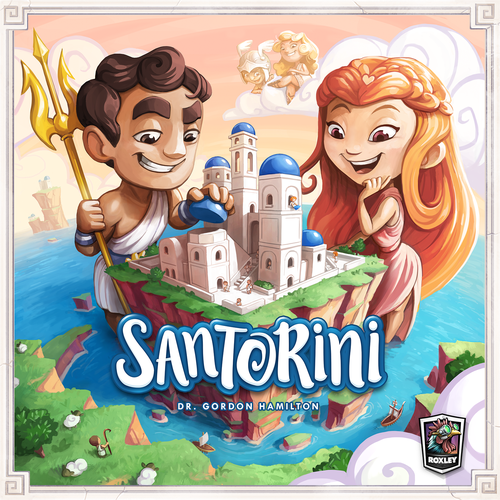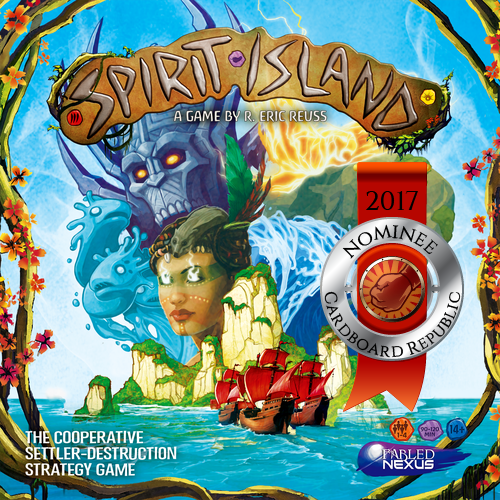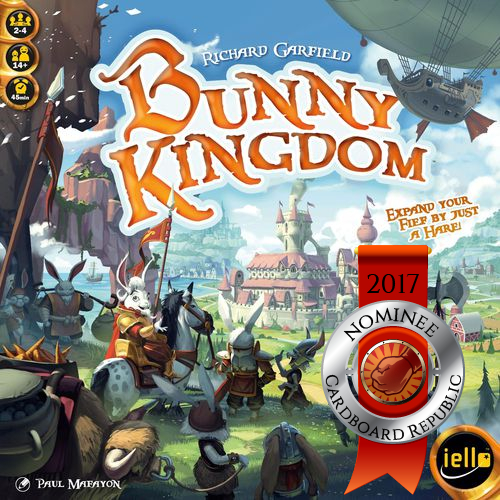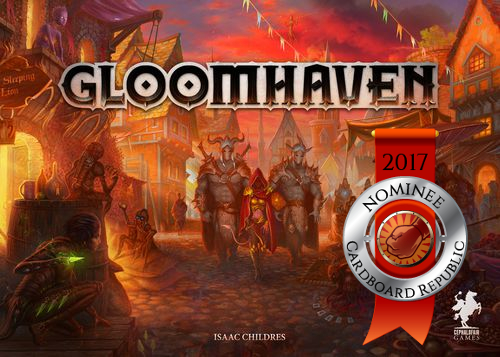The Cardboard Republic has rolled out the annual Laurels of the Republic awards, celebrating the best new games released in 2017 for each of the gamer archetypes. What follows are the finalists for one of those groups.
 Always looking for the next conflict, Strikers are those who prefer to make bold, declarative statements in their games. Their ambitions are simple: win by any means necessary, and do it quickly if possible. Strikers thrive in games where there are clear goals and the player’s chances of a particular strategy isn’t going to completely fall apart due to high degrees of luck or overly-lengthy affairs where their opponents will have ample opportunities to stop them. In short, the best Striker games are those where they are given a pointy stick and told in which direction to swing it.
Always looking for the next conflict, Strikers are those who prefer to make bold, declarative statements in their games. Their ambitions are simple: win by any means necessary, and do it quickly if possible. Strikers thrive in games where there are clear goals and the player’s chances of a particular strategy isn’t going to completely fall apart due to high degrees of luck or overly-lengthy affairs where their opponents will have ample opportunities to stop them. In short, the best Striker games are those where they are given a pointy stick and told in which direction to swing it.
And with that, here are The 2017 Laurel Finalists for Strikers:
Honorable Mention: Santorini
Publisher: Roxley Game Laboratories | Players: 2-4 | Play Time: 20-30 Minutes

Have you ever come across a game where you willingly accept the premise, but then when you try to explain that premise, you realize just how obfuscated it really is? Because that’s Santorini.
In Santorini, players act as gods trying to provide guidance to the development of a Mediterranean village. In concept, at least. In reality, Santorini is about as abstract as you can get while still retaining some semblance of favor, by way of variable player powers.
This hardly makes it a bad game, though. Quite the opposite: Santorini is the pinnacle of an abstract game where its brilliance resides with its simplicity. In it, players take turns moving one of their two pawns to an adjacent space on a gridded board, and then must add a building piece next to the new spot, slowly creating a navigable three-dimensional landscape. The first person to reach the fourth level wins.
Mixing 3D spatial elements and tactical maneuvering, Santorini is a short but elegant game of tit for tat, where both sides are locked into a continual dance of trying to gain the upper hand while blocking their opponent’s efforts to do the same. The god powers may provide variation across playthroughs, but it always remains a short challenge based solely on skill.
Because of this, Santorini easily deserves the honorable nod for the Striker category. And in truth, it only missed out further due to the fierce competition in the category this year. Make no mistake though: with stellar component quality and a 30 second ruleset, for those who like short abstract games of spatial competition, Santorini is like ambrosia from the gods themselves.
The Nominees

Number Five: Spirit Island
Publisher: Greater Than Games | Players: 1-4 | Play Time: 90-120 Minutes
 Welcome strangers to the pristine, unspoiled lands of my ancestors. Now, please, get out.
Welcome strangers to the pristine, unspoiled lands of my ancestors. Now, please, get out.
That’s the premise in the wonderfully subversive Spirit Island. It is a colonization game, except for one key difference: you aren’t the colonists. Instead, players are the powerful and strong-willed nature spirits trying to evict them.
Over the course of the game players act as a team, combining their efforts and abilities to disrupt, destroy, and remove a continual stream of colonizers attempting to spread across the island. The longer the colonists stay in a location, the more they damage they do to it, which is ultimately what you are trying to prevent. The longer you can stave off their efforts to take over, the more likely it is you will be able to scare them away and win. This is principally done through acquiring new spirit powers and developing devastating synergies – both on an individual and group level.
Normally Strikers aren’t hugely fond of most Co-Op games, largely because of the shared victory experience and the tendency for a lot of titles in the genre to have a fairly high degree of luck which dictates your odds of winning. So it’s particularly impressive that this year’s nominee list contains an unprecedented two co-ops that directly appeal to them, the first of which is Spirit Island.
The reason Spirit Island is stands out to Strikers is due to a combination of its singular purpose, knowing what the colonists are going to do each round, and the ability to do whatever it takes to persevere. Spirit Island’s difficulty often requires tough choices, even sacrificing one thing for another. Yet the fact that those choices are player-driven is key. Because it is precisely that mentality, of enduring at all costs in order to win, which caused this group to show up on its tropical shores in the first place.
Number Four: Seikatsu
Publisher: IDW Games | Players: 1-4 | Play Time: 15-30 Minutes

We never thought a game whose flavor revolves around birds and flowers would end up on a list for Strikers, mostly because that doesn’t exactly evoke feelings of something with a strong competitive bent to it.
But here we are.
Seikatsu is not even close to a knock-down, drag-out game of heated battle of ecological supremacy; it is easily the lightest game on this list. Yet Seikatsu deftly demonstrates with Zen-like calm that even games aimed at a more casual audience can be cherished by those who value straightforward rules, a specific goal to work towards, and the ability to reach those goals based on the strength of their decisions.
In other words, a game doesn’t need to be incredible complicated or complex to provide a spirited competition.
In this chip-laying game, (ideally three) players are populating a communal garden and trying to accumulate the most points for doing so. This is done by placing a chip from your hand and drawing a random replacement. Birds on the chips provide points when placed next to matching birds in adjacent spaces. Flowers on the other hand give you points at the end of the game based on the largest number of matching flowers in each row.
The twist is that those rows are based on your perspective when facing the board. This sets up a masterful dynamic where you have to carefully balance placing a tile for points now, points later, and ensuring that your opponent(s) aren’t able to unduly benefit from your actions.
With a wonderful table presence and the ability to provide weight to the whole ‘place a tile, draw a tile’ model, Seikatsu soars as a game for Strikers looking to scratch their competitive inclinations in a quick, original, and dare we say, leisurely way.
Number Three: Bunny Kingdom
Publisher: IELLO | Players: 2-4 | Play Time: 45-60 Minutes
 In the leporine lands of Bunny Kingdom, its big-eared denizens have secured peace through what we only assume was some kind of Watership Down type scenario. Now, various bunny factions have decided to start carving up the land into smaller fiefdoms under their control.
In the leporine lands of Bunny Kingdom, its big-eared denizens have secured peace through what we only assume was some kind of Watership Down type scenario. Now, various bunny factions have decided to start carving up the land into smaller fiefdoms under their control.
Using a mix of card drafting and area control, players spend four rounds drafting cards that either let you lay claim to spaces on the 10×10 board or are set aside for endgame bonuses. Your goal is to do what bunnies do best: grow and multiply quickly. The more spaces your settlement has, the more points it’s worth at the end of each round. This gives weight to nearly every decision, as point totals can escalate with jackrabbit-like speed.
What makes Bunny Kingdom particularly fiendish is that it gets more competitive the more you play. While perfectly serviceable as a lightweight contest of drafting the most ideal cards and building the biggest bunny burrows, Bunny Kingdom also contains some deeper strategy residing just under the surface. Your initial draft focus may be on taking what’s best for you, but as the game progresses, occasions will arise where it could be far more advantageous to pass on a card that’d be marginally good for yourself to ensure that your opponent doesn’t benefit from it even more.
If you’ve ever wanted a tutorial on the concept of hate-drafting, you’ll have ample opportunity here.
Bunny Kingdom may be devoid of direct combat, but there’s still has plenty to fight over in these lands. Through calculated player-led drafting decisions, this is a game where you very much win or lose based on the card selections you make, including occasionally sacrificing personal gain to stymie another player. For Strikers, those words alone are enough to get them hopping with interest.
Number Two: Gloomhaven
Publisher: Cephalofair Games | Players: 2-4 | Play Time: 45-120 Minutes

You had to know this one would show up somewhere. Billed as a card-driven legacy-style dungeon crawling co-op, Gloomhaven boasts nearly 18 pounds and 100 scenarios of gameplay content, and rocketed to the #1 rank on BGG rankings in a matter of months; odds were good for it to make an appearance. Not because of its popularity necessarily, but because in this case, the popularity is indeed based on merit.
Gloomhaven takes its name from the game’s central city, set in a unique fantasy world. From there, players embark as a group on a lengthy campaign full of adventures…mostly consisting of killing various monsters in different ways. This is largely fueled via rounds of combat wherein you use two cards at a time from your hand, the selections of which can be combined for clever actions, impeccable combos, and dishing plenty of damage. However, time is a factor as your hand slowly dwindles over time.
This direct and agile card system is why Gloomhaven found itself in the Striker nomination list over say Tacticians or Immersionists. When you peel back the thematic storylines and character development, at its heart Gloomhaven is about optimizing your group’s combat efficacy and finding the best strategy to win. More than anything else, playthroughs are tests the team must collectively overcome through reasoned decision-making and calculated risks. Each scenario allows Strikers to wade into fight after fight and feel from the onset that the largest impact on their chances of survival are their own choices.
So…yeah. There’s little surprise Gloomhaven made its way into this year’s Laurel nominees. What is surprising, though, is that it isn’t taking this category’s top spot. It was incredibly close, but for this year’s winner we actually have to turn to something with a much smaller footprint – albeit equally electric.
The Winner
2017 Striker Laurel – Tesla vs Edison: Duel
Publisher: Artana Games | Players: 2 | Play Time: 30 Minutes
 We’ll be honest: we didn’t predict this one either.
We’ll be honest: we didn’t predict this one either.
To anyone but Strikers, this may initially come off as somewhere been shocking and confusing. After all, how could a seemingly under-the-radar game like Tesla vs Edison: Duel beat the juggernaut that is Gloomhaven?
Well for one, hype isn’t everything. For another, Tesla vs Edison has two advantages over this year’s runner-up when it comes to an archetype that favors direct, impactful decisions that won’t get derailed by sheer luck. First, there are very few avenues in this late 19th century contest where you may lose the game because of a bad card flip. Second, your ability to win also doesn’t rely on anyone else.
Set in the same thematic world as its predecessor Tesla vs Edison: Duel is a two player iteration where each side portrays one of the leaders in the Current Wars of the late 1800s – a period when companies actively fought over whether AC or DC power should be used to run America’s cities. Over the course of just nine turns, this brisk half hour exercise has you draft cards to determine your available actions over three rounds. Though they vary, nearly every action focuses on gaining and maintaining an area majority in the game’s three contested regions. Whoever controls more of them at the end is the winner.
Whether by adding cities and stocks to your territory or actively blocking your opponent from acting in kind, Tesla vs is a quick, energetic duel that pits one player’s tactical decision-making acumen against the other as both sides attempt to outmaneuver one another to the very end.
It doesn’t take a bolt of lightning to understand why Strikers will appreciate this electrified skirmish. This is a group whose preferred games are concise, interactive, competitive, and where they can demonstrate how their actions led to a decisive win. And for 2017, no title hits all those marks better than Tesla vs Edison: Duel.
![]()
Tesla vs Edison Contest!
When it came to figuring out how we wanted to show off this year’s Striker Laurel we initially came up with a rather ingenious idea that both thematically tied into the game’s premise as well as upped the competitive stakes: having people compete against one another in chairs that delivered small electrical shocks when you lost control of one of the three regions. But our intern Claudius, various ethics experts, and our own legal department all independent shot it down pretty quick for some reason. So with little time to come up with something else, we’ve instead opted for the most direct approach: providing one lucky winner with the opportunity to enjoy the award-winning game first hand. That is what we’re going to to do right…now.
That’s right! Enter below for your chance at your very own copy of Tesla vs Edison: Duel!
a Rafflecopter giveaway
Note: In honor of their award recognition, Artana Games has kindly provided a copy of this game for giveaway purposes.
![]()
Be sure to check out the 2017 Laurel Award pages for the other archetypes once they go live!
Correction: an earlier version of the article indicated incorrectly that Santorini was a late 2016 release. It was indeed an early 2017 release.







